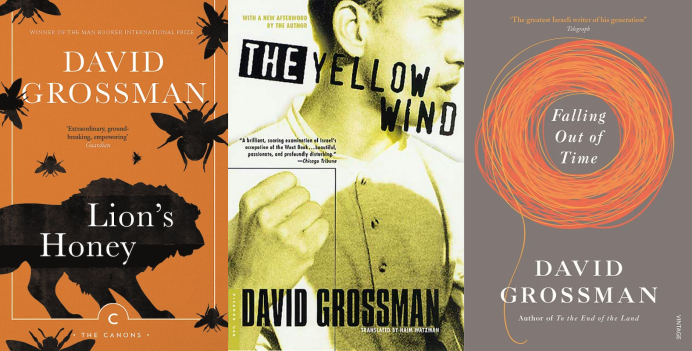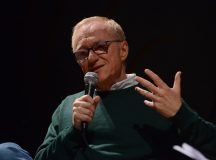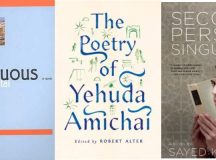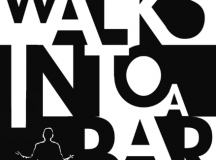Essayist and critic Liam Hoare suggests three books you have to read by Israeli novelist David Grossman.
David Grossman is Israel’s foremost living writer. Often lumped together in the Western imagination with Amos Oz and AB Yehoshua as one of the ‘three tenors’ of Israeli literature, Grossman in fact comes from a younger generation of writers, breaking onto the literary scene in 1983 with The Smile of the Lamb at a time when Oz and Yehoshua were already well-established.
His prose is rich, lyrical, and layered, influenced by Bruno Schulz, James Joyce, and Thomas Mann. He renders seismic emotions in quiet ways. His early works like The Smile of the Lamb, See Under: Love (1986), and The Book of Intimate Grammar (1991) traversed underexplored territory in Israeli literature including the occupation of the West Bank and the experiences and nightmares of second-generation Holocaust survivors. He did so, often, through the eyes of children and adolescents. After To the End of the Land, his work turned inward, away from what Grossman called the ‘burning reality’ of the present and towards personal tragedies and traumas, often to tremendous effect.
Novelist, journalist, essayist, Grossman continues to be a leading voice in the Israeli peace movement, most recently undersigning a letter in the New York Times calling on American lawmakers to withdraw their invitation to Israeli prime minister Benjamin Netanyahu to address both houses of Congress. His essays and commentaries have long proven foresighted and are, above all, full of decency and impressed with Grossman’s humanity and concern for the other.
With this list – a suggestion of his three best books – I have tried to encompass all aspects of Grossman’s work to show why, 40 years after his arrival as a writer of tremendous importance, it remains indispensable for so many.
Falling Out of Time (2011)
Grossman’s life was scarred, and his work transformed, by the death of his younger son, Uri, in the Second Lebanon War in 2006. He was already at work on To the End of the Land (2008) – in which a mother whose son is on the verge of completing his military service takes flight for the walking trails of the Galilee as to avoid the worst of all possible news—when, in the war’s final hours, Uri’s tank was hit by a rocket while trying to rescue soldiers from another tank in southern Lebanon. Not only Uri but all the members of his tank crew were killed in the incident.
The product of Grossman’s grief was his virtuoso composition Falling Out of Time. Quite unlike anything Grossman has written before or since, the work defies easy categorisation, removed from time and place and with shifting forms and styles between play, prose, and poetry (and credit here is due to its translator, Jessica Cohen, for finding a way to render all this so beautifully in English). Having written extensively from the perspective of children, in To the End of the Land, Falling Out of Time, and his much-lauded 2014 novel A Horse Walks into a Bar, the point-of-view shifts to adulthood – in the case of Falling Out of Time, to parents living through the trauma of having lost a child.
The book was, for Grossman, an attempt to find the words to say something that did not want to be said. It is a masterpiece.
The Yellow Wind (1987)
Beyond his talents as an Israeli novelist, Grossman can also make a claim to being one of the country’s great journalists. In 1987, twenty years after Israel’s victory in the Six Day War, the Israeli weekly Koteret Rashit sent Grossman – a fluent Arabic speaker – on a seven-week expedition around the West Bank. What he discovered – in refugee camps, schools, and military courtrooms – was, in a sense, how little Israelis truly knew about the other party to the Israeli-Palestinian conflict as well as the realities of the occupation they were enforcing. As the Israeli historian Tom Segev told The Paris Review: ‘We did not know, then, how much they hated us.’
Grossman observed an occupation that was radicalising the Palestinians living under it, and The Yellow Wind foreshadowed a world to come. Towards the end of the book, demonstrations, arrests, and acts of protest like stone-throwing and tire burning increase in frequency; ‘violence waited above like a torch sputtering in the wind’. Grossman concludes that ‘the history of the world proves that the situation we preserve here cannot last for long, and if it lasts, it will exact a deadly price’. The Yellow Wind, as writer and Fathom contributor Tal Kra-Oz once observed, ‘eerily foresaw the intifada which was to erupt later that year’ and cemented his place as ‘one of the most eloquent and outspoken figures on the Israeli left’.
Lion’s Honey: The Myth of Samson (2006)
In Lion’s Honey, Grossman deconstructed and demystified the myth and persona of Samson, turning him into a fully formed, human figure. No longer simply the warrior-hero, Grossman’s Samson was ‘a man whose life was a never-ending struggle to accommodate himself to the powerful destiny imposed upon him, a destiny he was never able to realise nor, apparently, fully to understand’. He was ‘a child who was born a stranger to his father and mother; the story of a magnificent strongman who ceaselessly yearned to win his parents’ love which in the end he never received’.
Grossman’s fascination with the episode of the lion’s honey derives from its glimpse into Samson’s inner life. ‘Samson extends his hand—without fear of the bees—and scoops honey into his mouth, and it touches the reader’s heart as he reaches out so simply, innocently, spontaneously’, he writes. There is ‘something mischievous’ about Samson sharing the honey with his parents – a moment ‘full of joie de vivre and even humour’. Here, he discovers Samson’s innocence. ‘How astonishing and poignant’, Grossman observes, ‘this gulf between enormous physical strength and a childlike soul’. The contrast between the image of the man and the nature of his soul speaks to a kind of higher truth.
Honourable Mentions
See Under: Love (1986), for a landmark book whose innovative, mesmeric treatment of the Holocaust, its legacy, and its memory announced Grossman as one of Israel’s greatest writers.
Sleeping on a Wire: Conversations with Palestinians in Israel (1992), for an important companion piece to his previous journalism in The Yellow Wind on the Israeli-Palestinian conundrum.
Writing in the Dark: Essays on Literature and Politics (2008), for essays and speeches, including an extraordinary speech Grossman gave to the annual Yitzhak Rabin Memorial Rally in Tel Aviv following the death of his son, Uri.




































